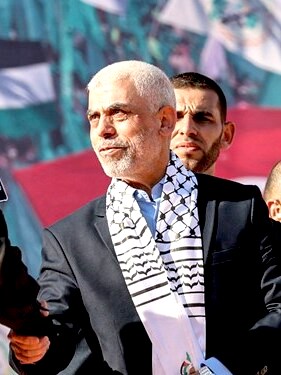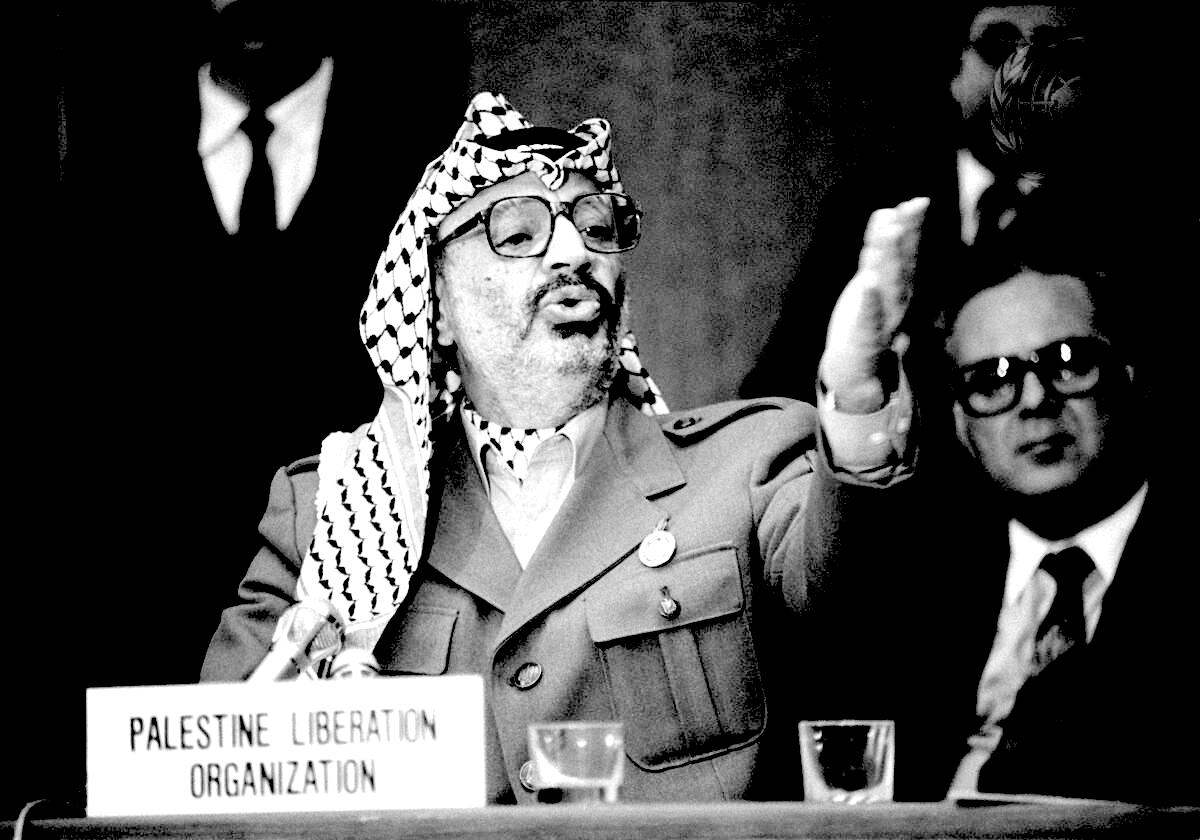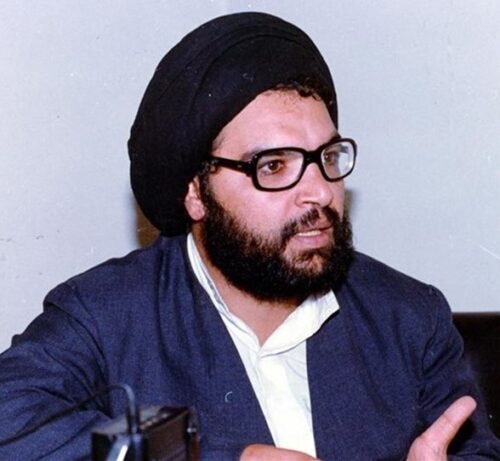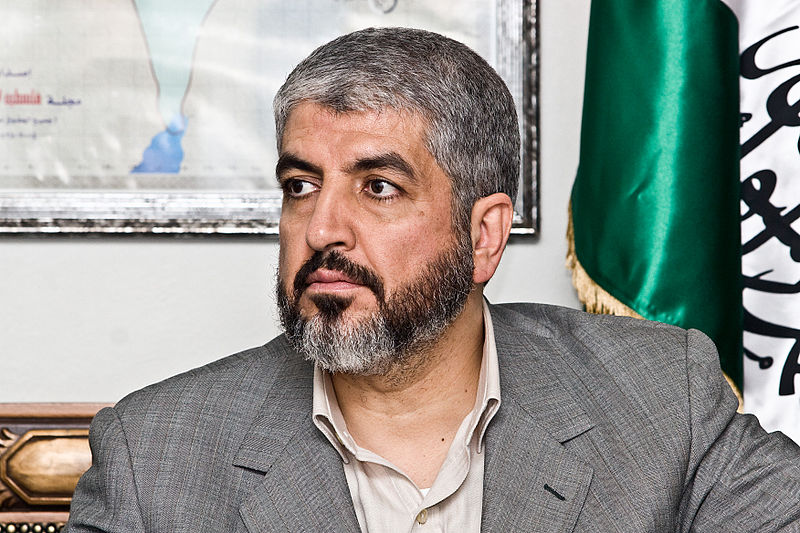Oct. 7 was a watershed event for Arab politics with the emergence of a force that engages militarily with Israel on the Palestinians’ behalf. The era of Yasser Arafat is over.

Free Palestine demonstration at the Israeli embassy in Washington, D.C., Dec. 5, 2023. (Diane Krauthamer, Flickr, CC BY-NC-SA 2.0)
By As`ad AbuKhalil
Special to Consortium News
 Like him or hate him, it is the age of Yahya Sinwar in Arab politics. One cannot think of any person who rivals the Hamas commander’s stature and status among the people of the region.
Like him or hate him, it is the age of Yahya Sinwar in Arab politics. One cannot think of any person who rivals the Hamas commander’s stature and status among the people of the region.
Oct. 7 was a watershed event in the history of the Arab-Israeli conflict. It changed the nature of the conflict, in terms of the emergence of an Arab front that rallies behind the Palestinians and engages in military battle with Israel on their behalf.
It also propelled a new Palestinian leadership that for the first time has categorically broken with the era of Yasser Arafat.
Arafat (largely with Gulf support due to fears of the radical alternative of George Habash) dominated Palestinian politics from 1968, in the wake of the battle of Karamah, until many years after his assassination by Israel in 2004.
Arafat’s footprint still remains in the corruption and incompetence of the Fatah movement and the collaborationist regime in Ramallah. Arafat was the one who, at the behest of the Clinton administration, basically abandoned armed struggle and for all intents and purposes dissolved the Palestine Liberation Organization or transformed it into a mere tool of the Israeli occupation.
Arafat even took dictates from the State Department to change the charter of the PLO which was drafted in 1964 and amended in 1968.
Arafat abandoned liberation in return for vague promises about future statehood in an undetermined piece of land within 22 percent of historic Palestine, and under the watchful eyes of the military occupation.
Arafat made peace with the enemy before he extracted any meaningful concession from them; he merely relied on the vague promises of U.S. administrations.
The Opposite of Arafat

Sinwar, commander of Hamas, in the Gaza Strip, shaking hands with a soldier in December 2023. (Fars Media Corporation, Wikimedia Commons, CC BY 4.0)
Sinwar is the opposite of Arafat: Arafat was bombastic, Sinwar is non-theatrical, and low key; where Arafat was prone to exaggeration, Sinwar is more precise in rhetoric.
Arafat had absolutely no military background except what he fabricated about his escapades in Jordan and elsewhere. Sinwar dirtied his own hands — so to speak — in battle not only against Israeli soldiers but also against collaborators and Israeli spies planted within the population in Gaza.
Where Arafat was loud and impulsive, Sinwar is quiet and thoughtful. Where Arafat was prone to compromises and making free concessions, Sinwar in the period since Oct. 7 has proven to be one of the toughest and shrewdest negotiators in the history of the conflict.
Anybody who read the ceasefire proposal that was presented by Hamas to Israel through intermediaries realizes that there are new Palestinian leaders and that the Fatah movement has been totally discredited and abandoned by its people.
Arafat never seriously studied Israeli politics and society. In fact he relied for his knowledge of the enemy on none other than Mahmoud Abbas, the Holocaust denier, to explain Israeli politics to him. Abbas, the current Fatah leader and president of the Palestinian National Authority, was the in-house expert on Israel within the Fatah movement during Arafat’s time.
(When Abbas completed his PhD in Moscow, dealing with Zionism, he submitted it for publication to the Institute of Palestine Studies. The founder and founding director of the institute, Professor Walid Khalidi, told me recently that he refused to publish the dissertation due to its blatant anti-Semitism).
Arafat, as former U.S. National Security Advisor Zbigniew Brzezinski said about him, was never serious about either fighting or diplomacy; and he miserably failed in both.

Arafat addressing U.N, Commission on Human Rights in Geneva, Feb. 19, 1988. (U.N. Photo)
Sinwar has thus far proven himself to be a tough fighter and tough negotiator and for that he has commanded, and will command, if he survives, the respect of Palestinians and many Arabs.
Even a Western-friendly polling firm published findings that show that Hamas and Sinwar are far more popular than Abbas and the Fatah Movement.
It is noteworthy that there haven’t been any public opinion surveys published since Oct. 7 to measure the popularity of Sinwar among the Arabs, but anecdotal and social media evidence indicate that his revolutionary status is rising in the eyes of Palestinians and many Arabs.
The PLO had corrupt leaders such as the pro-Syrian Zuhayr Muhsin who was assassinated in Cannes, France, in 1979, and Abu Az-Za`im of Fatah, whose wild parties in Beirut were legendary.
Sinwar, by contrast, lived among his people and ate with them and spent time in prison with them. It is in prison that Sinwar learned Hebrew and developed a deep knowledge and understanding of Israeli politics and society.
Sinwar is the only Palestinian leader I have seen who carried a revolver equipped with a silencer and it is because he has used it; his revolver is not there for show or symbolism as was the case of Arafat.
Sinwar was imprisoned by Israelis, and served a long sentence before he was freed in a prisoner exchange, not for murder of Israelis but for his chasing and hunting down of Israeli spies and infiltrators, collaborators and terrorists. The security shield within Gaza was engineered by Sinwar.

Sayed Abbas Al Mussawi, co-founder and secretary general of Hezbollah, 1952-1992. (Tasnim News Agency, Wikimedia Commons, CC BY 4.0)
Sinwar’s survival is questionable in this ongoing war. It is clear that Israel will do its utmost to kill him.
Of course, the notion that you can finish off a movement by killing its leader has proven its futility over and over again in the history of this conflict.
In 1992, Israel killed the then leader of Hezbollah, Abbas Mussawi, along with his wife and child, in the hope of finishing off Hezbollah. Instead, Israel got Hassan Nasrallah as the new formidable leader of Hezbollah.
Sinwar took over the Hamas movement before Oct. 7. The Doha, Qatar, branch of Hamas, led by Khalid Mishal, has lost much credibility by virtue of its close association with the Muslim Brotherhood movement, and with Turkey and Qatar.
Mishal also miscalculated when he expected the downfall of the Syrian regime in 2011 and threw in his lot with a Syrian armed uprising, supported by a Gulf-Western coalition.
After many years enjoying shelter in Damascus, Mishal thought a new regime would emerge that would be even more supportive of Hamas. But when the Syrian regime survived, Mishal became an obstacle in reconciling the movement with Syria, and with the axis of resistance.
In fact, top Hezbollah officials in the wake of Oct. 7 refused to meet with Mishal because they view him as having spoiled the relationship between Hezbollah and Hamas in 2011 and afterwards.

Hamas leader Khaled Mashaal, speaking with journalists in 2009. (Trango, Wikimedia Commons, CC by 3.0)
Sinwar headed the faction within Hamas that called for closer coordination with Iran and with Hezbollah, and which stressed the military option over diplomatic maneuvering. Mishal was mimicking the path of Arafat but with less political and maneuvering skills than the latter.
Each era in Palestinian history produces its own movements and its own leaders. The era of Oslo and the wide disillusionment by the Palestinian people of the consequences of Arafat’s historic, ostensible peace with Israel, led to a new version of Hamas that broke off from the history of the Fatah movement.
How Sinwar Will Be Judged

Hamas rocket attack from Gaza into Israel, Oct. 7, 2023. (Tasnim News Agency, Wikimedia Commons, CC BY 4.0)
No. 1) his ability to mobilize the military forces under his command and to forge an effective military response to Israeli occupation, regardless of how the military operation of Hamas is judged in the West.
The early period of Hamas witnessed the wide-scale use of devastating car bombs in the 1990s which generated negative responses even among the Palestinian people; many Arabs came to reject them as a tool of warfare. (Zionist gangs in Palestine introduced car bombs into the Arab-Israeli conflict by the bombing of the King David hotel in 1946 ).
The Al Aqsa Deluge attack of Oct. 7 will be judged and evaluated and Hamas will have to explain some aspects of it. The official document that Hamas released months after the attack entertained the possibility of an international, impartial investigation of all aspects of the violence of Oct. 7.
[See: AS`AD AbuKHALIL: Hamas’ Official Account]
No. 2) Sinwar will be judged on his management of the ceasefire negotiations over the last few months and thus far he has proven himself to be the toughest and shrewdest negotiator that the Arabs have seen in the history of the Arab-Israeli conflict.
Unlike Arafat, he has also withstood the bullying of Arab despots who have often, historically, placed pressure on the Palestinian national leadership at the behest of the Western alliance. He has done this while in hiding, possibly underground.
Thus far Sinwar has been categorical in not compromising on his demand for the protection of the Palestinian people, while not negotiating the plight of Hamas’ leadership, for which he has asked no guarantees.
Arafat’s PLO in 1982 made the issue of Palestinian leadership and demands for guarantees for its safety its top priority. This explains how Palestinian refugee camps of Lebanon were left behind only to be massacred in Sabra and Shatila by Israel and its militias a few weeks after the departure of PLO forces from Lebanon in September 1982.
Sinwar will dominate Palestinian and Arab politics if he survives, and his legacy will shape the future of Palestinian action for years to come if he dies.
As`ad AbuKhalil is a Lebanese-American professor of political science at California State University, Stanislaus. He is the author of the Historical Dictionary of Lebanon (1998), Bin Laden, Islam and America’s New War on Terrorism (2002), The Battle for Saudi Arabia (2004) and ran the popular The Angry Arab blog. He tweets as @asadabukhalil
The views expressed are solely those of the author and may or may not reflect those of Consortium News.
Please Donate to the
Spring Fund Drive!



Surely with Arafat having died decades ago, this is the era of Abbas? He is the leader who has been collaborating with America’s 51st state. Don’t blame Arafat, just because some other person says they are doing this in his name or following him.
If you want to talk about the end of the era of Abbas, that might be accurate. But Arafat was killed during a siege from America’s 51st state decades ago.
When I see a post by Mr. AbuKhalil, I know I’m about to get a concise lesson in history and context. No exception here! As always, a worthy read for western sheep drowning in the propaganda swamp. Too bad (for peace) they won’t get to Consortium to read it.
Excellent summary – thank you.
Yes
Thank you for informing the readers of Consortium News
This the most profound and detailed description of the struggle against US supported Zionism that I have ever read Congratulations for shedding clear light on this vastly important subject
Sinwar and Nasrallah are the only Arab leaders who have ever achieved anything against Zionist thieves and thugs.
The rest are just cringing, servile, quisling whores serving Zionist interests.
Obviously your background in Arab history, on top of your bitter comment, doesn’t take you that far back to recall the name, Gamal Abdul Nasser.
Thank you for this important and insightful analysis and the historical context provided.